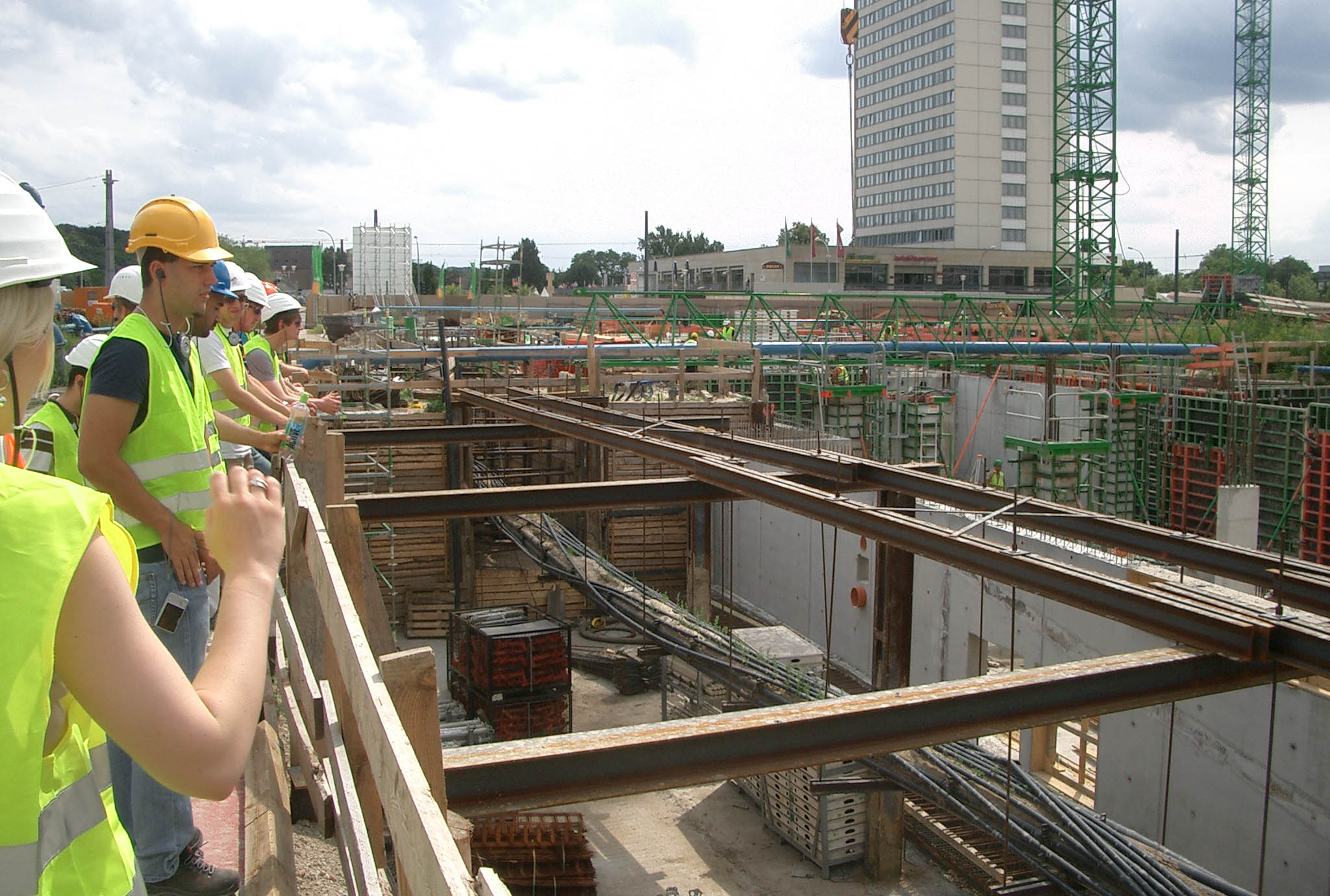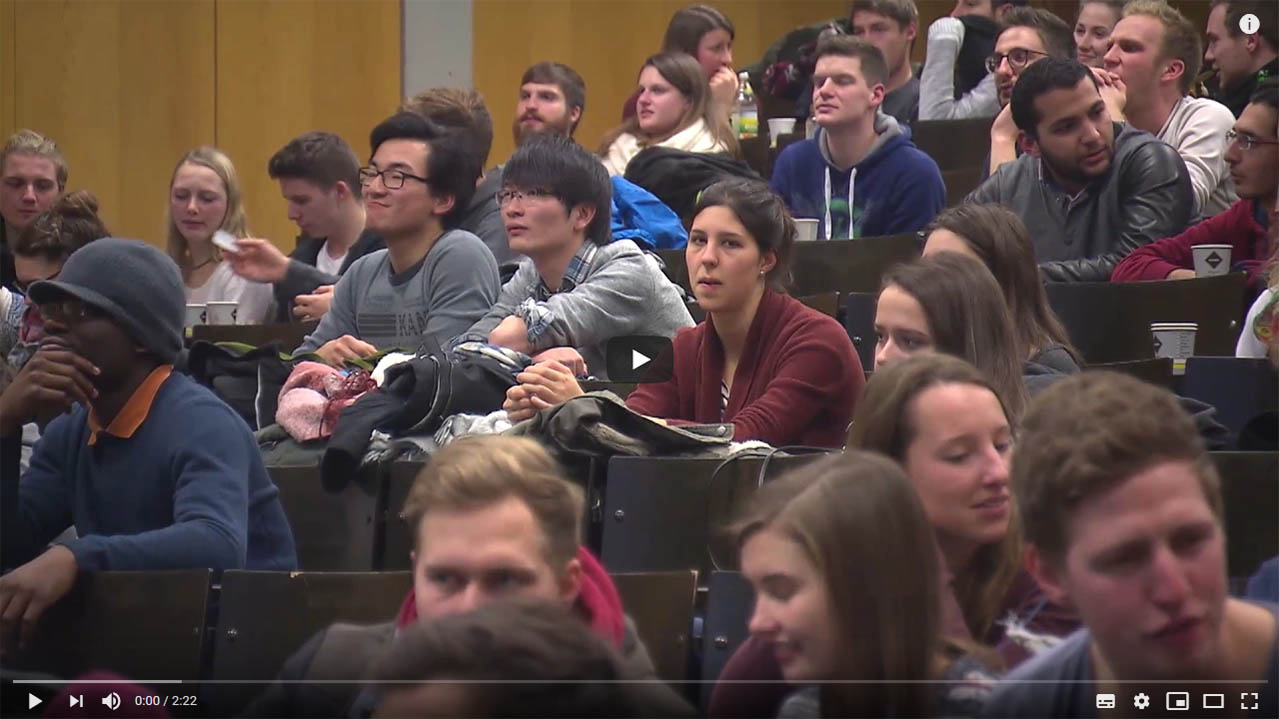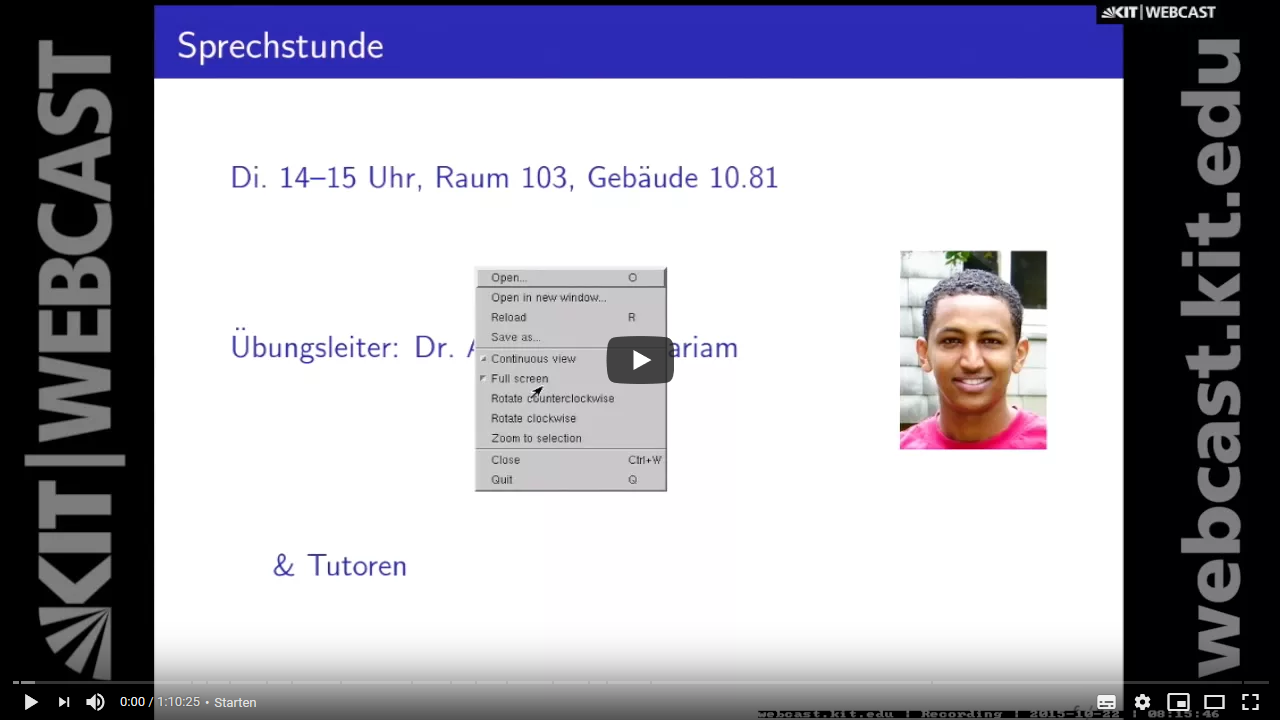Degree: Bachelor of Science (B.Sc.)
Regular program length: 6 semester (full-time program)
Credit points (ECTS): 180 credit points
Language of instruction: German
Higher semester: no
Higher semester: winter and summer term
First semester: September 15
Higher semester: September 15 for winter term, March 15 for summer term
First semester: July 15
Higher semester: July 15 for winter term, January 15 for summer term
Program details
What is it all about?
Civil engineering is an engineering science that deals with the conception, planning, design, construction, calculation, manufacture and operation of all types of structures that are relevant to our society. These include buildings for structural, transportation, civil and hydraulic engineering, facilities and infrastructure. During your studies, you will learn how to design these types of structures, plan and calculate them in a resource- and energy-efficient manner and build them safely, economically and in an environmentally friendly way. You will deal with various building materials, building constructions and, of course, structural analysis. You will also be introduced to social, ecological and economic aspects of construction as well as resource and energy-efficient issues. Overall, you will gain an overview of the entire planning, construction and maintenance process of a building, or in short: its entire lifecycle.
Program structure
During your studies, you have various subjects, which consist of one or more modules. A module deals with a specific topic and consists of one or more courses. In the module handbook for your degree program, you will find a description of the modules and their subject assignment as well as a study plan. This gives you an orientation as to which courses you should attend in which semester in order to complete your studies within the standard period of study. It takes into account a balanced distribution of courses over the individual semesters. It also ensures that you are first taught the important basics before moving on to more advanced topics. Your individual course of study may differ from this.
Compulsory subjects in the foundation part of your studies:
- Mechanics (28 CP): here you will learn about the Statics of Rigid Bodies, Strength of Materials, Dynamics and Hydromechanics. These are essential aspects of mechanics in civil engineering.
- Mathematics (25 CP): mathematical skills are essential in civil engineering. This is why you will immerse yourself in Analysis and Linear Algebra, Integral Calculus and Functions of Several Variables, Applied Statistics and Differential Equations.
- Building Materials and Construction (21 CP): this subject gives you an initial insight into the importance of building materials for the construction of buildings. This also includes Building Physics and Building Construction Theory.
- Engineering Fundamentals (10 CP): this subject teaches the basics of Project Management, Geology in Civil Engineering and Construction Informatics. Further engineering fundamentals can be chosen, e.g. construction chemistry and surveying.
- Interdisciplinary Qualifications (6 CP): here you can choose courses relatively freely according to your interests and improve your skills, e.g. from the courses offered by the House of Competence, Sprachenzentrum or the interdisciplinary courses offered by the FORUM.
Compulsory subjects in the specialized part:
- Structural Analysis (10 CP)
- Structural Engineering (14 CP)
- Water and Environment (12 CP)
- Mobility and Infrastructure (12 CP)
- Technology and Management in Construction (11 CP)
- Geotechnical Engineering (11 CP)
- Engineering Science Supplement (8 CP)
The degree program has a modular structure and is divided into a three-semester foundation part in which engineering fundamentals such as mechanics, mathematics and Building Materials Science are taught, as well as a three-semester specialized part which includes in-depth modules in areas such as Structural Engineering, Water and Environment, Mobility and Infrastructure, Technology and Management in Construction and Geotechnical Engineering. All subjects are set (compulsory subjects), in the specialized part you have the opportunity to choose between different modules in the subject Engineering Supplement.
Internship (voluntary)
Please note: you do not have to complete an internship in construction as part of your bachelor's degree. However, it is strongly recommended in order to gain practical experience. An internship can be completed in companies or enterprises in the construction industry that are operationally involved in the planning, calculation, execution or operation of construction measures or facilities. The voluntary internship should ideally be scheduled in the second half of the degree program. There is no compulsory internship.
Stays abroad
KIT offers a wide range of options for stays abroad, from individual courses to a year abroad overseas. If you are interested in a longer stay abroad, it is advisable to contact the International Students Office or the KIT Department of Civil Engineering, Geo and Environmental Sciences directly to find out about outgoing options at an early stage.
Bachelor's thesis
At the end of your bachelor's degree, you will complete your bachelor's thesis, an academic paper that allows you to apply and deepen the knowledge and skills you have acquired. It usually deals with a specific topic from your field of study and requires independent research, analysis and writing. The bachelor's thesis takes 3 months to complete. The bachelor's thesis also includes a presentation of your results in the form of a lecture.
Additional information
In addition to the module handbook, our booklet about the study program is a useful source of information. It also covers topics such as application procedure, starting your studies and career prospects.
Qualification profile of the graduate
The study program Civil Engineering at the Karlsruhe Institute of Technology (KIT) with the degree Bachelor of Science (B.Sc.) provides a fundamental-, research- and practice-oriented qualification in all professional fields of civil engineering.
Civil engineers design, plan, calculate, construct, manage and maintain all kinds of buildings and infrastructure required by our society. This very wide range of their professional activities is expressed by the job title 'Civil Engineer'.
The six-semester Bachelor's program is structured in the two phases Basic Studies and Basic Subject Studies, each with a duration of three semesters. In the Basic Studies the fundamentals of engineering science are imparted particularly in the subjects Mechanics, Mathematics as well as Building Materials and Structural Design. Further basic skills are gained specifically in the subject Interdisciplinary Qualifications. In this subject among others, skills in communication and teamwork can be credited, obtained in an internship which is voluntary but strongly recommended. In the Basic Subject Studies the subject-related basic knowledge in the major fields of the professional activity of a civil engineer is imparted. These are allocated to the foci 'Structural Engineering', 'Water and Environment', 'Mobility and Infrastructure', 'Technology and Management in Construction Operation' as well as 'Geotechnical Engineering'. The students show by their Bachelor's Thesis that they are able to work by themselves and in limited time with scientific methods on a technical problem, to comprise the essential contents and results clearly structured in a written text and to present them in an oral presentation.
Having passed the Bachelor's program at the Karlsruhe Institute of Technology (KIT), the graduates attained the scientific qualification for starting a master degree program in Civil Engineering or a related field. They have knowledge and master methods of the entire range of civil engineering. Therefore, they are able to deepen themselves later in every shaping of the professional profile and to become acquainted with technical problems mostly by themselves. They think holistically and thus they harmonize social, ecological and economic aspects in order to develop problem solutions. Their strength is a sound and up to-date technical knowledge which is supplemented by good teamwork and communication skills.
Career prospects
Specialists with a degree in civil engineering have excellent career prospects and many fields of activity. They can be found in managerial positions in the following sectors: structural and civil engineering, engineering offices, public administration, consulting firms, railroads, postal services, insurance companies, the energy industry, software companies and many more. In this profession, you mainly design, plan, calculate, build and manage residential, commercial, administrative and industrial buildings, transportation routes (roads, bridges, tunnels, airports), hydraulic structures (locks, dams, reservoirs, etc.), power plants, environmental protection facilities (irrigation and drainage systems, sewage treatment plants, waste incineration plants), civil protection structures and much more. In civil engineering, you will expand your specialist knowledge more and more, and you must be able to adapt flexibly to constantly changing tasks in your professional life. In all fields of activity, you should also think holistically and reconcile social, ecological and economic aspects. You will always have direct contact with people and should be able to work in a team and communicate well. Your strength lies in your technical know-how, which is complemented by a good dose of creativity. As construction companies operate worldwide, foreign languages are also an important "tool of the trade". This is not least because many foreign projects in the field of development cooperation are supervised by civil engineers.
As the bachelor's degree is a foundation course and forms the first part of a complete course of study consisting of a bachelor's and master's degree, you could also decide to continue your studies with a master's degree. You could choose one of the consecutive master's programs offered at KIT to deepen your skills and knowledge and thus qualify for management positions in the above-mentioned industries.
The special feature of KIT is that you can choose from a total of five different consecutive master's programs: Civil Engineering, Technology and Management in Construction, Engineering Structures, Mobility and Infrastructure and Water Science and Engineering (in English). Completion of the master's program is strongly recommended at this point.
Characteristic features of the degree program
Characteristic features of Civil Engineering B.Sc. at KIT
a construction internship before and during the bachelor's degree program is not mandatory, but is recommended
good previous knowledge of mathematics and physics is of course necessary, but missing basic knowledge can be made up for at the MINT-Kolleg if required
orientation week at the start of studies
involvement of students in research projects in various disciplines
after the bachelor's degree, you can choose between five consecutive master's degree programs:
What KIT has to offer
- central campus close to the city forest and right next to the city center
- orientation week before the start of lectures
- 24-hour library offering single and group working places
- wide range of inexpensive catering options (dining hall, cafeteria, Koeri and Pizzawerk)
- numerous interdisciplinary offers for personal and professional development, e.g. Lernlabor, Schreiblabor and Perspektivenlabor
- study abroad, e.g. via Erasmus
- excellent university sports facilities with a large selection of sports
- comprehensive cultural offerings with university orchestras, choirs and theater groups
- extensive support for career entry and self-employment
- Lernraum app
- internationally oriented degree programs and diverse exchange programs
- modern laboratories and practical teaching methods
- diverse student initiatives, clubs and opportunities to actively participate in campus life
- stay in touch after graduation via the alumni network
Admission and language requirements
Higher education entrance qualification (HZB)
Germans and persons of equal status to Germans (i.e. EU/EEA nationals and non-EU/EEA nationals with a German higher education entrance qualification) are entitled to study at KIT if they have one of the following qualifications:
- General higher education entrance qualification (Abitur)
- (relevant) subject-restricted higher education entrance qualification (not Fachhochschulreife)
- Delta examination of the University of Mannheim (for holders of a Fachhochschulreife)
- recognized advanced vocational training (e.g. master craftsperson) or vocational training, professional experience and aptitude test for those with professional qualifications
For further options, see §58 of the "Landeshochschulgesetz" (State Higher Education Act).
Please note: German nationals with a foreign school-leaving qualification must have the relevant "Regierungspräsidium" (regional authority) certify that their qualification is equivalent to the German Abitur.
For non-EU/EEA nationals with a foreign school-leaving certificate (hereinafter also referred to simply as non-EU/EEA nationals), the school-leaving certificate from some countries is recognized as a direct university entrance qualification in Germany. In many cases, however, in addition to the school-leaving certificate, a university entrance examination and/or a successful year of study in the home country and/or the "Feststellungsprüfung" must be proven with valid documents in order to be allowed to study a bachelor's degree in Germany. You can find the country-specific regulations in the DAAD admissions database or on the Anabin website (in German only) of the "Zentralstelle für ausländisches Bildungswesen" (Central Office for Foreign Education). Further information is available from the International Students Office.
Language requirements and certificates
For the bachelor's degree program in Civil Engineering, you need sufficient knowledge of the German language. Your German language skills must correspond to at least level C1 of the Common European Framework of Reference for Languages (CEFR).
Proof of sufficient German language skills
Your higher education entrance qualification (HZB) is sufficient proof of your German language skills,
-
if you obtained it at a German-speaking school in Germany or abroad,
-
if you are a graduate of a bilingual secondary school in Germany or abroad and have passed a bilingual German examination, such as the AbiBac or the Gemischtsprachiges International Baccalaureat (GIB) or
-
if you graduated from a foreign school, but there is another official agreement with the respective country on the recognition of your school-leaving certificate or language certificate as proof of language proficiency for university studies in Germany.
A complete list of foreign school-leaving qualifications and language certificates that are recognized as proof of sufficient German language skills can be found on the website of the Kultusministerkonferenz (Standing Conference of the Ministers of Education and Cultural Affairs of the Länder in the Federal Republic of Germany).
If you did not obtain your higher education entrance qualification at a German-speaking institution, you must provide a separate language certificate - regardless of your nationality. Only the following are accepted
- the passed „Prüfungsteil Deutsch“ of the Feststellungsprüfung,
- the passed DSH with the overall result DSH-2,
- the passed TestDaF level 4 in all four parts of the exam (reading comprehension, listening comprehension, written expression, oral expression) or
- a comparable, recognized certificate of sufficient German language skills.
To find out which other recognized certificates can be accepted as comparable by KIT, please contact
- as a German or German-equivalent applicant: Studierendenservice
- as an applicant with non-EU citizenship: International Students Office
Please note:
Language certificates are extremely important application documents that can prevent your enrollment if you do not submit them on time. Therefore, check early on in the application process whether you have the necessary language certificates for your degree program and, if necessary, plan to take one of the language tests mentioned above. The deadline by which you must submit language certificates corresponds to the enrollment deadline stated in your admission offer. In justified cases, you can apply for an extension of this deadline. The extension can be granted until the start of the lecture period at the latest.
Additional necessary requirements for enrollment
For Germans and those with German equivalent status, an additional necessary requirement for enrollment is proof of participation in a study orientation test (e.g. www.was-studiere-ich.de) or a study orientation consultation in accordance with §7 of the "Landeshochschulgesetz" (State Higher Education Act), e.g. by the Student Advisory Service (ZSB) of KIT. Non-EU/EEA nationals do not have to provide this proof.
Application portal
Application for the 1st semester
not possible
Application for a higher semester
Prepare for your studies
- all year round Information events of the Student Advisory Service (ZSB) on your desired degree programs, application and admission as well as starting your studies
- Try out KIT - clarify your interests and support your study decision by taking advantage of the diverse summer offers or participating in taster lectures.
- Campus Day: experience the campus live (together with your family) in spring and make your first personal contacts with the departments and their students
- Studieninformationtag: visit KIT on the state-wide study information day in November and experience the lecture hall feeling for the first time
- topMINT: you don't know yet what you want to study and need to bridge the summer? Take advantage of our orientation semester before you start your studies.
- Use our central online portal studienstart.kit.edu with all the important information and services you need to prepare for your studies and your first semester at KIT. Be it preparatory courses, study-related courses or mentoring programs.
- Orientation phase before the start of lectures - from students for students to get to know KIT, your fellow students and your student council. You will receive specific information on this when you enrol.
- You will be welcomed by KIT with a colorful supporting program at the welcome event for first semester students. You will receive the invitation after your enrollment.
Contacts
Student advisor
Student Advisory Services (ZSB)


Karlsruher Institut für Technologie (KIT)
Zentrale Studienberatung (ZSB)
Engelbert-Arnold-Str. 2
76131 Karlsruhe
Karlsruher Institut für Technologie (KIT)
Studierendenservice
Kaiserstr. 12
76131 Karlsruhe
First point of contact for international applicants
Karlsruher Institut für Technologie (KIT)
International Students Office (IStO)
Adenauerring 2
76131 Karlsruhe
Printed matter
Module handbook
| Titel | Download |
|---|---|
| Module handbook Civil Engineering Bachelor | PDF (German) |
| Public view Civil Engineering Bachelor in the Campus Management System | Link (German) Link (English) |
Statutes and regulations
| Titel | Stand | Download |
|---|---|---|
| 2025 KIT 071 Satzung zur Änderung der Zulassungs- und Immatrikulationsordnung des Karlsruher Instituts für Technologie (KIT) | 20.11.2025, veröffentlicht 20.11.2025 | |
| 2025 KIT 060 Neubekanntmachung der Zulassungs- und Immatrikulationsordnung des Karlsruher Instituts für Technologie (KIT) | 08.10.2025, veröffentlicht 08.10.2025 |
Teaching calendar and course catalog
WT 2025/26
10-27-2025 to 02-21-2026
ST 2026
04-20-2026 to 08-01-2026
WT 2026/27
10-26-2026 to 02-20-2027
ST 2027
04-19-2027 to 07-31-2027
WT 2027/28
10-25-2027 to 02-19-2028
ST 2028
04-18-2028 to 07-29-2028
Lectures will not take place:
- from 12-24 to 01-06
- the week after Pentecost
- on all public holidays in the state of Baden-Wuerttemberg









